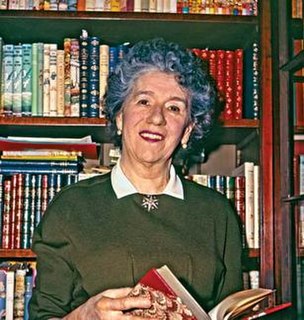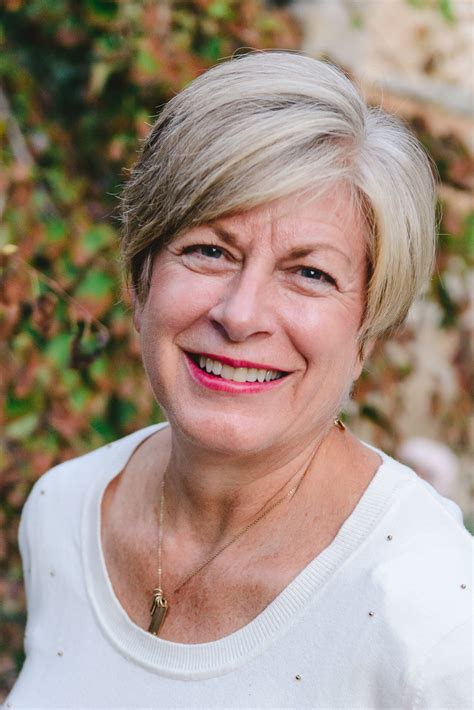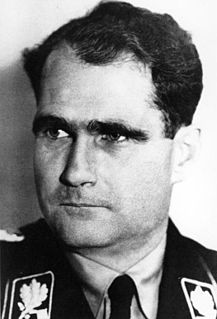A Quote by Enid Blyton
Mothers were much too sharp. They were like dogs. Buster always sensed when anything was out of the ordinary, and so did mothers. Mothers and dogs both had a kind of second sight that made them see into people's minds and know when anything unusual was going on.
Related Quotes
We need money to scale up the services that bring medicine to mothers. The United States government's doing that. There's a global fund that's providing money. mothers2mothers provides for mothers who come in who don't have education, who don't have support. mothers2mothers employs mothers with HIV, mothers who were patients recently in the very same facilities. We take those mothers who were patients who've had their babies, we bring them back, we train them, we pay them, to be health care professionals.
Mothers Who Know Honor God They bring daughters in clean and ironed dresses with hair brushed to perfection; their sons wear white shirts and ties and have missionary haircuts. These mothers know they are going to sacrament meeting, where covenants are renewed. These mothers have made and honor temple covenants. They know that if they are not pointing their children to the temple, they are not pointing them toward desired eternal goals. These mothers have influence and power.
As important as the father is in the life of a child, even he must take second place to mother during the first three years of life.... Consequently, mothers actually have more to do with producing a predisposition toward homosexuality than fathers. Two kinds of mothers are particularly harmful - smother mothers and dominating mothers.
Mothers have not always had the most important role in their children's upbringing, when they had other economic roles to play. Inpast centuries, fathers were the key parent in the upbringing of the next generation, because moral training, not emotional sensitivity, was thought to be central to successful child-rearing. Mothers were thought to corrupt their little ones with too much affection and not enough stern training.
Most of us in the baby-boom generation were raised by full-time mothers. Even as recently as 14 years ago, 6 out of 10 mothers with babies were staying at home. Today that is totally reversed. Does that mean we love our children less than our mothers loved us? No, but it certainly causes a lot of guilt trips.
Daughters could survive a powerful mother, but boys found it almost impossible. Such boys were often severely damaged and spent the rest of their lives running away from their mothers, or from anybody who remotely reminded them of their mothers; either that, or they became their mothers, in a desperate, misguided act of psychological self defence.
We're contemptuous of 'distracted' working mothers. We're contemptuous of 'selfish' rich mothers. We're contemptuous of mothers who have no choice but to work, but also of mothers who don't need to work and still fail to fulfill an impossible ideal of selfless motherhood. You don't have to look very hard to see the common denominator.
Generations of women have sacrificed their lives to become their mothers. But we do not have that luxury any more. The world has changed too much to let us have the lives our mothers had. And we can no longer afford the guilt we feel at not being our mothers. We cannot afford any guilt that pulls us back to the past. We have to grow up, whether we want to or not. We have to stop blaming men and mothers and seize every second of our lives with passion. We can no longer afford to waste our creativity. We cannot afford spiritual laziness.
I have two children myself. I always laugh; they have you playing mothers pretty early, us women. You look at the television, the mothers get younger and younger, and the children get older and older, and you start to wonder when these people had these children. Were they breeding when they were 12?
Mothers and fathers act in mostly similar ways toward their young children. Psychologists are still highlighting small differencesrather than the overwhelming similarities in parents' behaviors. I think this is a hangover from the 1950s re-emergence of father as a parent. He has to be special. The best summary of the evidence on mothers and fathers with their babies is that young children of both sexes, in most circumstances, like both parents equally well. Fathers, like mothers, are good parents first and gender representatives second.
Navajo infants get so attached to cradleboard that they cry to be tied into it. Kikuyu infants in Kenya get handed around several"mothers," all wives to one man. . . . Mothers in rural Guatemala keep their infants quiet, in dark huts. Middle-class American mothers talk a blue streak at them. Israeli kibbutz mothers give them over to a communal caretaker . . . Japanese mothers sleep with them. . . . All these tactics are compatible with normal health--physical and mental--and development in infancy. So one lesson for parents so far seems to be: Let a hundred flowers bloom.
My coming to England in this way is, as I realize, so unusual that nobody will easily understand it. I was confronted by a very hard decision. I do not think I could have arrived at my final choice unless I had continually kept before my eyes the vision of an endless line of children's coffins with weeping mothers behind them, both English and German, and another line of coffins of mothers with mourning children.





































